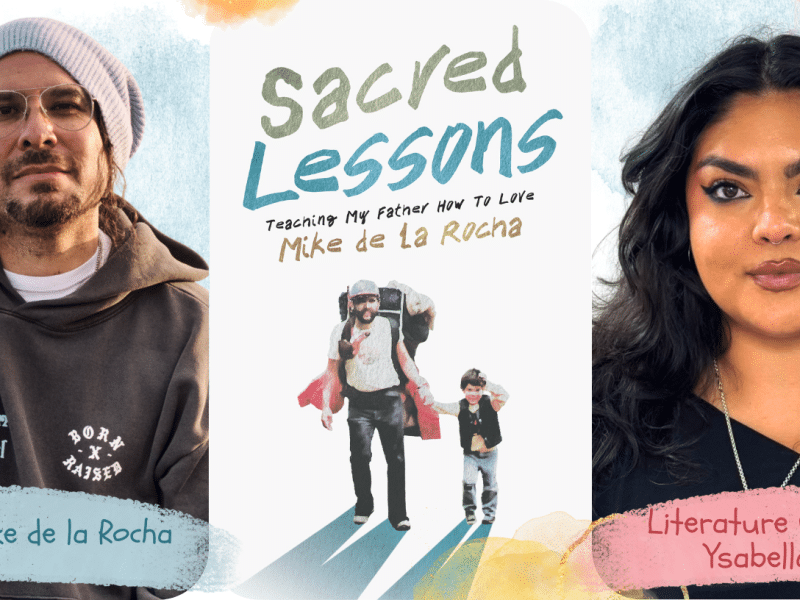Latine Authors Are Renowned in Sci-Fi and Fantasy. Why Aren’t More of their Books Being Published?
From being told their stories weren’t wanted to finding success and representation, how have Latine sci-fi and fantasy authors fought for their voices to be heard? Are publishers truly embracing diversity or just checking a box?

Authors and agents say more support is needed at all levels of publishing to ensure speculative fiction books by Latinx authors get the attention they deserve.
This article republished from the 19th News with permission.
Romina Garber had always been an avid reader of fantasy stories, especially Harry Potter, but something ate at her: She could never find another Latina in the stories.
“I couldn’t find someone that reflected me or represented me, and that always really bothered me,” she said. So Garber wrote the story of a young girl who discovers she’s a lobizona, a werewolf of Argentine folklore. But when Garber began looking for literary representation for the book that would eventually be “Lobizona,” 15 years ago, no one wanted it.
Garber remembers one agent telling her that “no one cared about Argentine immigrants.” There was no American market for the title, and it’s not what people wanted to read. Garber felt her identity, not just her book, being rejected.
“He was talking about me, he wasn’t talking about my characters,” Garber said. “It really crushed me. And after that, I just realized I can’t write about myself.”So she began writing allegorical science fiction instead, creating a world where everyone is divided up by their zodiac sign. Garber found an agent with this new concept and finished publishing the four-book series in 2017. But Garber’s mind drifted back to the first book she tried to sell about an undocumented immigrant lobizona. It felt more urgent than ever: The news was filled with stories of immigrant children being detained in cages during the Trump administration’s border crackdowns.
Now armed with an agent from her science fiction series, her book was sold to a publisher. “Lobizona,” the first in the Wolves Of No World Duology, was released in 2020. Garber regrets that she ever shelved the story in the first place. “I should never have stopped fighting.”
There have been a few standout successes for Latinx authors in the realm of speculative fiction — which includes fantasy, science fiction and dystopian stories — and many are written by women and LGBTQ+ authors. Books such as Silvia Moreno-Garcia’s “Mexican Gothic” and Aiden Thomas’ “Cemetery Boys” have been New York Times bestsellers. Moreno-Garcia’s “The Daughter of Doctor Moreau” is up for the genre’s prestigious Hugo Award.
Publishers have backed a few bright stars, but that doesn’t translate into broader support. Publishing, both the industry and the authors, are overwhelmingly White. For Latinx authors, that can mean an industry that flattens cultural nuances, tokenizing and misrepresenting the speculative worlds they are dreaming into existence.
Analysis has shown that 95 percent of English-language fiction books published from 1950 to 2018 were written by White authors. A 2019 report on the racial diversity of the publishing industry showed 76 percent of the staff are White, primarily cisgender, heterosexual women. Only 6 percent of the publishing industry is Latinx, despite representing 19 percent of the U.S. population.
Speculative fiction has been used to explore Latinx experiences for decades. Foundational scholars in Chicano studies, like Gloria Anadúlza and Cherríe Moraga, have incorporated science fiction storytelling into their works, said Matthew David Goodwin, assistant professor of Chicano studies at University of New Mexico at Albuquerque. His research for the last 15 years has focused on Latinx people in science fiction.
Two key elements of science fiction are representations of the future and technology, said Goodwin. He sees the impact on his students, most of whom are Chicana, when they read Latinx science fiction stories.
“Every single semester, they say, ‘I have never seen a Chicana character in the future. I’ve never seen a Mexican character in the future.’ And they’re very excited about it even if they don’t care about science fiction,” Goodwin said. “They see that’s significant.”
There are specific genre themes that resonate with Latinx experiences, too.
“The migration is really central to science fiction, and Latinx writers are picking up on that. And so the journey to outer space becomes a kind of mirror for migration from Cuba to Florida or from crossing the border,” Goodwin said. “And then you can deal with all the other issues that come in about how workers are treated in the U.S.”
Science fiction gave Garber a chance to highlight real-world problems that the Latinx community faces, even if the characters weren’t explicitly Latinx. Her Zodiac series “tackles xenophobia and discrimination and the prejudices we hold, but I had to do it in this ‘silly’ way of using the zodiac signs, because I found that using real world stuff was so charged,” she said. “It had to be this symbolic representation.”
Goodwin is confident there is an appetite for Latinx speculative fiction: He has co-edited several anthologies of Latinx science fiction. The third one is currently being compiled, and like the last two will be funded via Kickstarter — a direct demonstration of people fronting money to read these stories.
It’s a “no-brainer” that women and LGBTQ+ people are writing some of the most highly acclaimed speculative fiction books, said CeCe Lyra, an agent at P. S. Literary Agency and co-host of “The Shit No One Tells You About Writing” podcast.
“If you have always belonged, if you’ve never had to claw your way … then you don’t have to go to the fantastical. The world that’s in front of you is enough because it’s straightforward,” Lyra said. “You don’t have a second life that you live that you don’t get to share with others.”
In recent years, editors have been more enthusiastic about acquiring Latinx speculative fiction, Lyra said. There was a huge push to acquire more books centered on race and diverse perspectives in 2020, after the Black Lives Matter protests sparked a racial reckoning among industries.
Vanessa Aguirre, an assistant editor at St. Martin’s Press, agrees that demand from publishers is on the rise.
“People are just more aware of the stories that aren’t being told, and the voices that aren’t being centered,” Aguirre said. “Part of the nature of science fiction and fantasy is wanting to explore new worlds,” she said — even if those worlds are new to only the White imagination.
Still, Lyra wonders if the investment feels complete. Authors of color tend to get lower advances for their books, even if they have an established track record of success. She has seen how books that aren’t positioned well — with a robust marketing plan and dedicated staff behind it — don’t succeed.
“It’s a noble initiative. But part of me wonders if it’s more about feeling like you’re checking a box almost as opposed to actually doing the work,” Lyra said. “Because buying the books isn’t enough. … You must properly support these books.”
Part of it, Lyra said, is that many people in the publishing industry don’t know “how to even pitch the story.” Many people are familiar with the Latin American literary tradition of magical realism, which infuses magic into an otherwise ordinary world, and have heard of books like “One Hundred Years of Solitude” by Gabriel García Márquez.
But this can be a double-edged sword: Magical realism is a cultural tradition that offers inspiration to some authors, but it can also be used to pigeonhole others. It is widely accepted for Latinx authors to write magical realism, Goodwin said, but that doesn’t carry over to other speculative genres.
Zoraida Córdova, author of the Brooklyn Brujas series and “The Inheritance of Orquídea Divina,” said that at a publicity event for “Labyrinth Lost” a panelist kept referring to her book as magical realism. Córdova had to correct them and say the book, which follows three sister brujas in Brooklyn, was actually urban fantasy.
A lack of understanding of the Latin American diaspora and few Latinx editors are part of the reason why Córdova thinks Latinx fantasy has struggled to take off. Editors don’t know how to define the genre and don’t know what to look for.
“I hesitate to say that this is because of publishers,” said Córdova, when asked about reasons for a rise in prominent Latinx speculative fiction. “I almost feel like it’s in spite of publishers.”
Garber needed someone to review the Spanish she used in “Lobizona,” but no editors were equipped to help her. She had to ask the book’s translator to review the Spanish in the original text. Later, her publisher chose to translate the book into neutral Spanish, despite all the characters speaking the Argentine dialect in the English version. Because of that, Garber got heat from at least one Argentine reviewer for inaccurate representation
Publishing can be somewhat risk-averse, so any increase in speculative fiction titles by Latinx authors can be helpful because it gives them a point of comparison. These previously published “comp titles” are used by authors, agents and editors to get buy-in for a book. Editors like Aguirre can point to their success to build stronger cases for new titles.
An editor can say, “‘Look, this book did super well, somebody took a chance on this book, and this book is similar to that.’ So it obviously makes the decision easier even from a financial point of view,” Aguirre said.
But it is hard to find comp titles when stories like yours aren’t given a chance. When Córdova was trying to sell her book “Labyrinth Lost,” which came out in 2014, publishers had never seen anything like it before. “Because there was nothing to comp it to,” she said.
Despite that hesitation, she found a publisher. But Córdova had to change the name of her manuscript; it was originally titled “Bruja.”
“They needed to change the title because they said that the readership would not understand what the word bruja meant,” she said. “To me the understanding was like, obviously English-speaking White people, their demographic.”
But just over a year later, Córdova’s publisher proposed the title “Bruja Born” for the second book in the trilogy. “I don’t know what happened in those 18 months, but they sort of did a 180 in like, oh, diversity is good. Now Spanish is OK,” she said.
A book’s perceived value translates into how much authors are paid for their work. Publishing houses give authors a monetary advance based in part on how well they think the book will sell. Agents can negotiate better terms for the writers they represent when there are multiple interested parties. In other words, publishers need to follow through on commitments to diverse acquisitions.
“As an agent, it’s harder for me to push for significantly better terms if there’s only one person interested. So if you only have one editor who’s really into a story of a three generations of Mexican-American women, then the price is not going to go super up,” Lyra said. “But if you have five editors interested then you’ll get those numbers.”
But competition can be difficult when it feels like there are only so many opportunities to go around. Publishing can foster a sense of scarcity and stoke fears that a manuscript will get rejected because there is already another book by a Latinx author recently acquired, said an author who spoke to The 19th on condition of anonymity because she was concerned sharing her experiences would negatively impact her career and livelihood.
“People like to recycle platitudes like ‘a rising tide lifts all boats’ or ‘there’s room for all of us to succeed,’ but I think it’s a little more complicated than that for marginalized authors. We’re more likely to be on the receiving end of a rejection saying, ‘We already have one of these,’” the author said.
This tokenization is part of what made Rafael Nicolás turn away from traditional publishing. After he self-published his novel “Angels Before Man,” a queer retelling of the fall of Satan, he got an agent and received interest from editors about republishing the book and its sequels
Nicolás revised “Angels Before Man” to submit to editors at publishing houses, and he wanted to increase the number of “Latin Americanisms” in the story. He asked his agent whether that would result in pushback from editors, but they told him the opposite: It might make the book more marketable.
That gave Nicolás pause. He has observed a flattening of Latin American identity — the pan-continental term is rooted in colonialism, he pointed out — and a desire for aesthetics over authentic individual history.
“It’s just like checking off a representation list,” Nicolás said. “The entire way publishing thinks about diversity just kind of makes me uncomfortable.”
“Ultimately, at the end of the day, they care about selling whatever you’re writing to a White audience,” Nicolás continued. “And I don’t think that’s going to change at all.”
That, combined with insinuations that his books might need to be heavily changed due to the amount of queer sex and violence in them, made him change his mind. He stopped submitting to publishers and self-published the revised version of his book this September. He foresees self-publication for all of his future titles.
Going forward, authors want to see more complex depictions of the Latinx experience and richer displays of the diversity of the diaspora, including stories by Indigenous and Afro-Latinx authors.
The publishing landscape can look bleak for speculative Latinx authors, but attitudes are changing. And Latinx editors and agents are excited to usher through stories that represent them.
“We’re out here, people who want to acquire Latino voices, people who want to champion them, they’re in publishing,” Aguirre said. Change is happening, and organizations such as Latinx In Publishing and Las Musas provide mentorship, opportunities and much-needed camaraderie.
Garber feels the power of community through Las Musas, and sees how things have changed. When Garber thinks about how her manuscript was rejected 15 years ago, she can’t imagine it happening now. “And if it did, I would feel more empowered to go take it to my people,” she said. “I feel like we’re less silent, I feel less powerless. We’re nowhere near done, but I think we’re moving in the right direction.”




